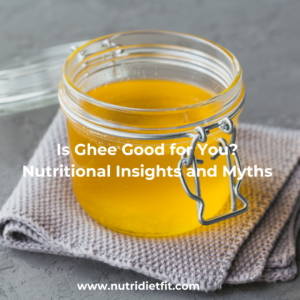
Ghee is a calorie dense food which provides 135kcal per one tablespoon(15grams).It is a good source of MUFA.Ghee contains 100% fat , 0 % carbohydrates and 0% protein
Ghee is rich in important nutrients like vitamin A, omega-3 fatty acids, and conjugated linoleic acid. It may also help reduce gut inflammation and support heart health
A randomized clinical trial involving 206 healthy participants aged 20–60 years suggested that ghee consumption resulted in a significant decrease in total cholesterol and triglycerides along with a significant increase in HDL cholestrol also when compared to oil (1).
Calories in Ghee
| Ghee (quantity in gms) | Calories(in kcal) |
| 1 teaspoon ghee calories ( 5 grams) | 45 |
| 1 tablespoon ghee calories (15 grams) | 135 |
| Half cup ghee calories (50 grams) | 450 |
| 1 small cup ghee calories (100 grams) | 900 |
NUTRITIONAL BREAKDOWN OF GHEE
| Nutrients in ghee | Nutritive value(1 tablespoon) |
| Calories | 134 kcal |
| Fat | 14.9 g |
| S.fat | 9.3 g |
| Mufa | 4.3 g |
| Pufa | 0.5 g |
| Cholesterol | 38.4mg |
Source:IFCT data tables (2)
PROS OF USING GHEE IN COOKING
Ghee can be made by heating butter to remove the water and milk solids from the fat.
Ghee is completely free of milk sugar lactose and milk protein casein, which makes it suitable for consumption for individuals with intolerances.
Ghee has a high smoke point of (250°C), which is the temperature at which fats become volatile and begin to smoke.
Heating ghee also appears to produce much less of the toxic compound acrylamide than heating vegetable oils (3).
The butyrate in ghee supports digestive health by nourishing the cells of the gut lining and reducing inflammation.
CONS OF USING GHEE IN COOKING
Ghee is high in saturated fats, which, when consumed in excess, can contribute to increased LDL cholesterol levels and raise the risk of heart disease.
Ghee is calorie-dense, with about 135 calories per tablespoon. Overconsumption can lead to weight gain if not monitored within a balanced diet.
Production of ghee at high heat, its cholesterol may become oxidized. Oxidized cholesterol is linked to an increased risk of several diseases, including heart disease (4)
3 POPULAR GHEE MYTHS BUSTED
1. Ghee lubricates the joints
There is a popular myth that ghee lubricates joints.It is the synovial fluid constituted with suspended connective tissues and hyaluronic acid that lubricates joints.
2. Ghee increases cholesterol
Studies suggests that ghee increases HDL(good) cholesterol while maintaining LDL(bad cholesterol).Thus it can be included in moderation as part of healthy well balanced diet.
3. Ghee is Bad for Heart Health
Ghee contains saturated fats, but moderate consumption does not necessarily harm heart health. Ghee also contains beneficial compounds like conjugated linoleic acid (CLA) and butyrate, which have anti-inflammatory and heart-protective properties. It can be part of a heart-healthy diet when consumed in moderation.
REFERENCES:
1.Sharma H, Zhang X, Dwivedi C. The effect of ghee (clarified butter) on serum lipid levels and microsomal lipid peroxidation. Ayu. 2010 Apr;31(2):134-40.
2.ICMR-Indian Food Composition Tables
3.Daniali G, Jinap S, Hajeb P, Sanny M, Tan CP. Acrylamide formation in vegetable oils and animal fats during heat treatment. Food Chem. 2016 Dec 1;212:244-9.
4..Zhang Q, Ai Y, Dong H, Wang J, Xu L. Circulating Oxidized Low-Density Lipoprotein is a Strong Risk Factor for the Early Stage of Coronary Heart Disease. IUBMB Life. 2019 Feb;71(2):277-282

1 Comment
It’s very informative!
Thank you !